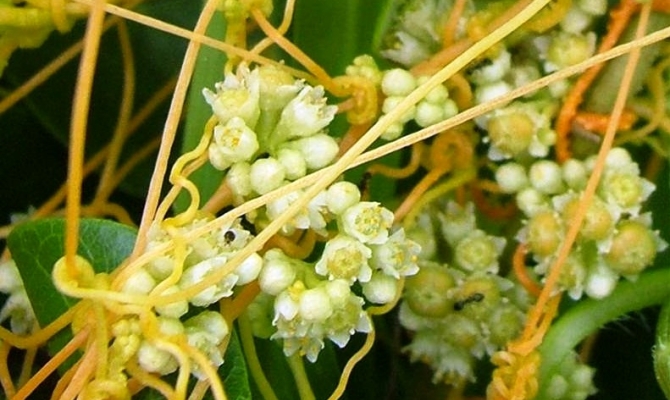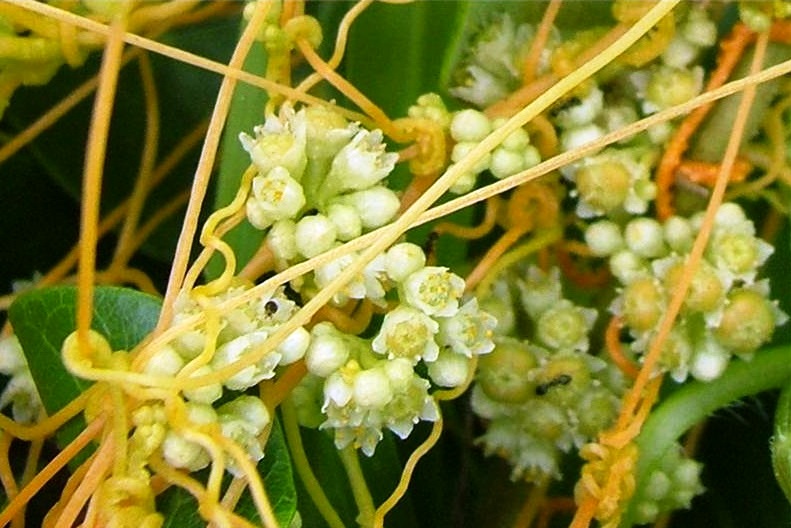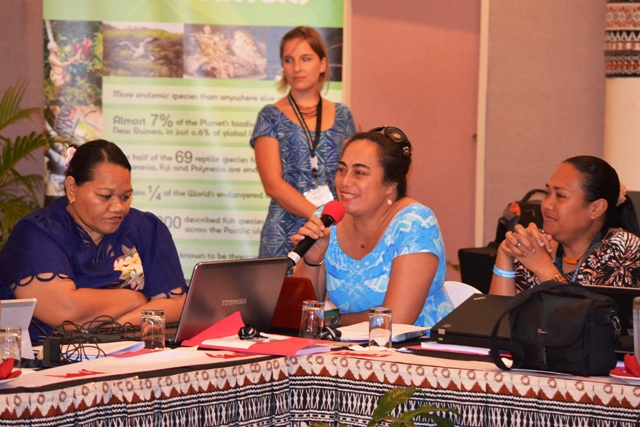
Island and Ocean Ecosystems
15 August 2014, Nadi, Fiji - The "Prevention, control and management of invasive alien species in the Pacific islands" project led by the Secretariat of the Pacific Regional Environment Programme (SPREP) and funded by the Global Environment Facility (GEF) is supporting the Cook Islands in its work to remove unwanted species with seven planned activities, several of which are now underway.
A collaborative campaign has been launched in Rarotonga by the Arorangi Boys Brigade Company and the Cook Islands National Environment Service to manage the invasive plant Dodder, Cuscuta Campestris species. This weed uses 'fangs' to literally suck the life out of plants. The Boys Brigade Company consisting of members aged between 12 to 17 years old, will implement a programme to locate the invasive alien plant species on Rarotonga and put measures in place to remove the plant.
 Custcuta Campestris Species, taken from the BioNET-EAFRINET Factsheet. Photo by Sheldon Navie
Custcuta Campestris Species, taken from the BioNET-EAFRINET Factsheet. Photo by Sheldon Navie
"We're working with the boys brigade to build their capacity to identify the species, review and decide upon the best method of control. We're also taking them through the different stages of controlling invasive alien species," said Ms. Elizabeth Munro, of the Cook Islands National Environment Service.
"Once equipped with the skills to identify cuscuta, they will develop awareness programmes, conduct GIS mapping of sites where the cuscuta is found and will work with the overall Rarotonga community to locate these plants for removal."
This programme will be incorporated into the ongoing activities of the Arorangi Boys Brigade until December. If successful, there is the possibility this approach could be replicated for other invasive alien species eradication programmes in the Cook Islands.
"We're really pleased by all the actions happening in the Cook Islands" said Mr. David Moverley, the Invasive Species Adviser of the Secretariat of the Pacific Regional Environment Programme (SPREP).
"This regional project has helped strengthen these actions in the Cook Islands and in nine other countries in the Pacific. We are really impressed by all that is happening and look forward to favourable outcomes."
Also on the list for eradication in the Cook Islands is the Red Passionfruit Vine, Passiflora rubra, an inedible passionfruit vine that is present on the islands of Mauke as well as Atiu and Mitiaro. Work has been underway by the Mauke Environment Officer since 2006 to eradicate the species from Mauke which has a thriving Maire (Alyxia elliptica) industry, a viable economic income for families on Mauke.
The passionfruit vine is a creeping plant that grows over trees blocking sunlight and killing desirable plants. If the control programme continues on the same path, eradication should be in the near future once the existing seed bank is exhausted.
 Ms. Elizabeth Munro, addressing the plenary in Nadi, Fiji
Ms. Elizabeth Munro, addressing the plenary in Nadi, Fiji
"The project started by manually removing the plant, first ensuring there were no adult plants that flower or bear fruit, now we are at the stage where we need to remove the seedlings. This invasive red passionfruit vine is found in the raised coral (also known as makatea) where the maire also grows. The invasive plant is now at a stage where it is hard to locate or remove seedlings in between the rock crevices, so we are looking at other methods of removal," said Ms. Munro.
It's not only unwanted plant species that are being eradicated. On the island of Suwarrow, rats are at the centre of an activity to remove them. Last year rat bait was distributed on four islands over a six week period. Ongoing monitoring of the presence of rats is now being carried out by the caretaker of Suwarrow. A biosecurity plan for the island of Suwarrow is being developed in partnership with Te Ipukarea Society, an environmentally focused NGO in the Cook Islands.
"This biosecurity plan will look at putting a system in place for all boats that travel to Suwarrow to ensure they are free of rats. We'll then look at extending these plans to other islands in the Cook Islands, " said Ms. Munro.
"More and more people are gaining awareness of invasive alien species. Eradication of an invasive alien species is a very long process and requires the support of partnerships working together as much as possible with other government ministries and community groups; it is not something that can be done by one government ministry alone."
Through the project which provided the Cook Islands with just over 300,000 USD in funds, the National Environment Service is also supporting other initiatives, including the establishment of a bio-lab for the Ministry of Agriculture to help continue research in Integrated Pest Management.
"Next on our list of activities to do is the development of a National Invasive Species Strategy and Action Plan. This won't only have an environment focus but also an agricultural and marine focus. We are looking at a whole of country approach and will invite many different stakeholders to input and have ownership of this strategy," said Ms. Munro.
The "Prevention, control and management of invasive alien species in the Pacific islands" Project is funded by the Global Environment Facility, implemented by the United Nations Environment Programme and executed by the Secretariat of the Pacific Regional Environment Programme. It began in 2012 and will come to an end in 2016.
Invasive Alien Species was featured at the Pacific Joint Preparatory Meeting to the Convention of Biological Diversity COP12, Convention on Migratory Species COP 11 and Ramsar COP 12, held in Nadi, Fiji from 11 to 15 August.
Countries represented at the one week conference are the Cook Islands, Fiji, Federated States of Micronesia, Kiribati, Marshall Islands, Nauru, New Zealand, Palau, Papua New Guinea, Samoa, Solomon Islands, Tokelau, Tuvalu and Vanuatu. Partners and stakeholders from the Pacific Islands Forum Secretariat, United Nations Development Program, WWF Pacific, UNEP, CBD, CMS, Convention on International Trade on Endangered Species (CITES).
For further information please contact Mr. David Moverley at [email protected]
A collaborative campaign has been launched in Rarotonga by the Arorangi Boys Brigade Company and the Cook Islands National Environment Service to manage the invasive plant Dodder, Cuscuta Campestris species. This weed uses 'fangs' to literally suck the life out of plants. The Boys Brigade Company consisting of members aged between 12 to 17 years old, will implement a programme to locate the invasive alien plant species on Rarotonga and put measures in place to remove the plant.
 Custcuta Campestris Species, taken from the BioNET-EAFRINET Factsheet. Photo by Sheldon Navie
Custcuta Campestris Species, taken from the BioNET-EAFRINET Factsheet. Photo by Sheldon Navie"Once equipped with the skills to identify cuscuta, they will develop awareness programmes, conduct GIS mapping of sites where the cuscuta is found and will work with the overall Rarotonga community to locate these plants for removal."
This programme will be incorporated into the ongoing activities of the Arorangi Boys Brigade until December. If successful, there is the possibility this approach could be replicated for other invasive alien species eradication programmes in the Cook Islands.
"We're really pleased by all the actions happening in the Cook Islands" said Mr. David Moverley, the Invasive Species Adviser of the Secretariat of the Pacific Regional Environment Programme (SPREP).
"This regional project has helped strengthen these actions in the Cook Islands and in nine other countries in the Pacific. We are really impressed by all that is happening and look forward to favourable outcomes."
Also on the list for eradication in the Cook Islands is the Red Passionfruit Vine, Passiflora rubra, an inedible passionfruit vine that is present on the islands of Mauke as well as Atiu and Mitiaro. Work has been underway by the Mauke Environment Officer since 2006 to eradicate the species from Mauke which has a thriving Maire (Alyxia elliptica) industry, a viable economic income for families on Mauke.
The passionfruit vine is a creeping plant that grows over trees blocking sunlight and killing desirable plants. If the control programme continues on the same path, eradication should be in the near future once the existing seed bank is exhausted.
 Ms. Elizabeth Munro, addressing the plenary in Nadi, Fiji
Ms. Elizabeth Munro, addressing the plenary in Nadi, Fiji"The project started by manually removing the plant, first ensuring there were no adult plants that flower or bear fruit, now we are at the stage where we need to remove the seedlings. This invasive red passionfruit vine is found in the raised coral (also known as makatea) where the maire also grows. The invasive plant is now at a stage where it is hard to locate or remove seedlings in between the rock crevices, so we are looking at other methods of removal," said Ms. Munro.
It's not only unwanted plant species that are being eradicated. On the island of Suwarrow, rats are at the centre of an activity to remove them. Last year rat bait was distributed on four islands over a six week period. Ongoing monitoring of the presence of rats is now being carried out by the caretaker of Suwarrow. A biosecurity plan for the island of Suwarrow is being developed in partnership with Te Ipukarea Society, an environmentally focused NGO in the Cook Islands.
"This biosecurity plan will look at putting a system in place for all boats that travel to Suwarrow to ensure they are free of rats. We'll then look at extending these plans to other islands in the Cook Islands, " said Ms. Munro.
"More and more people are gaining awareness of invasive alien species. Eradication of an invasive alien species is a very long process and requires the support of partnerships working together as much as possible with other government ministries and community groups; it is not something that can be done by one government ministry alone."
Through the project which provided the Cook Islands with just over 300,000 USD in funds, the National Environment Service is also supporting other initiatives, including the establishment of a bio-lab for the Ministry of Agriculture to help continue research in Integrated Pest Management.
"Next on our list of activities to do is the development of a National Invasive Species Strategy and Action Plan. This won't only have an environment focus but also an agricultural and marine focus. We are looking at a whole of country approach and will invite many different stakeholders to input and have ownership of this strategy," said Ms. Munro.
The "Prevention, control and management of invasive alien species in the Pacific islands" Project is funded by the Global Environment Facility, implemented by the United Nations Environment Programme and executed by the Secretariat of the Pacific Regional Environment Programme. It began in 2012 and will come to an end in 2016.
Invasive Alien Species was featured at the Pacific Joint Preparatory Meeting to the Convention of Biological Diversity COP12, Convention on Migratory Species COP 11 and Ramsar COP 12, held in Nadi, Fiji from 11 to 15 August.
Countries represented at the one week conference are the Cook Islands, Fiji, Federated States of Micronesia, Kiribati, Marshall Islands, Nauru, New Zealand, Palau, Papua New Guinea, Samoa, Solomon Islands, Tokelau, Tuvalu and Vanuatu. Partners and stakeholders from the Pacific Islands Forum Secretariat, United Nations Development Program, WWF Pacific, UNEP, CBD, CMS, Convention on International Trade on Endangered Species (CITES).
For further information please contact Mr. David Moverley at [email protected]